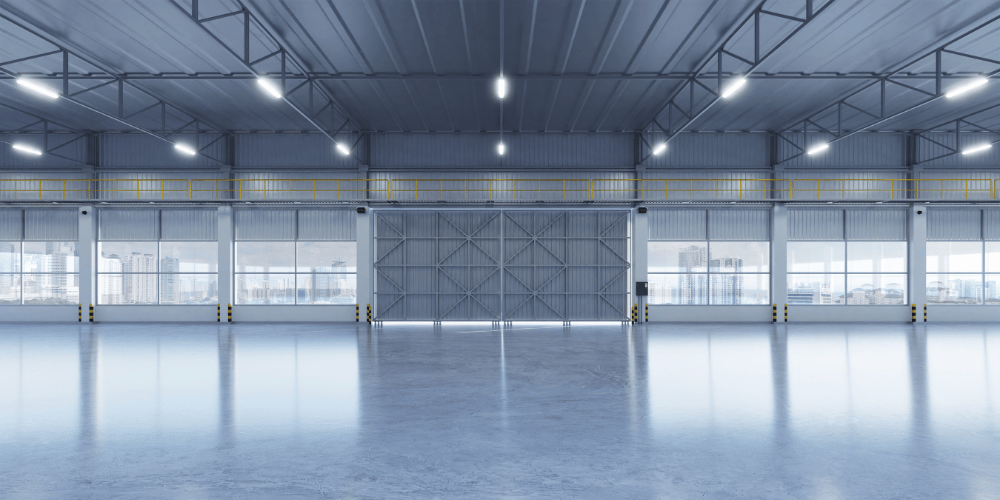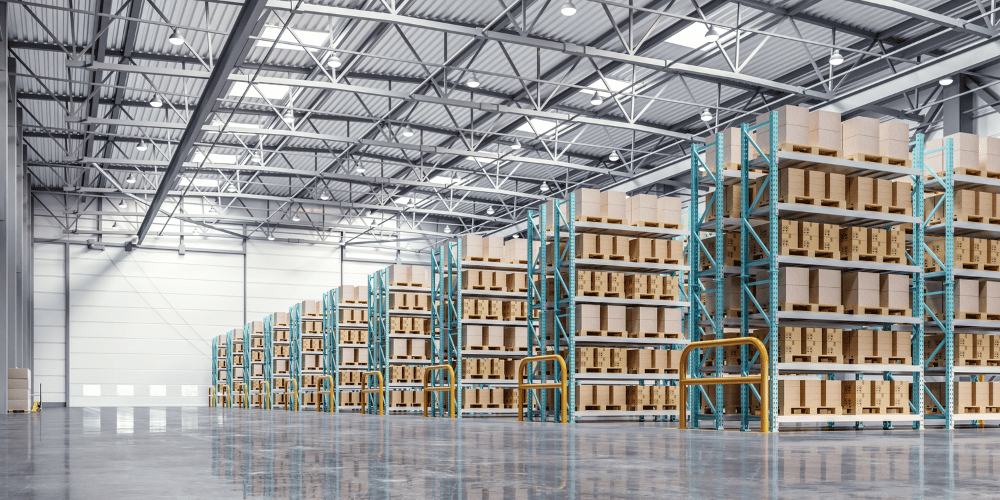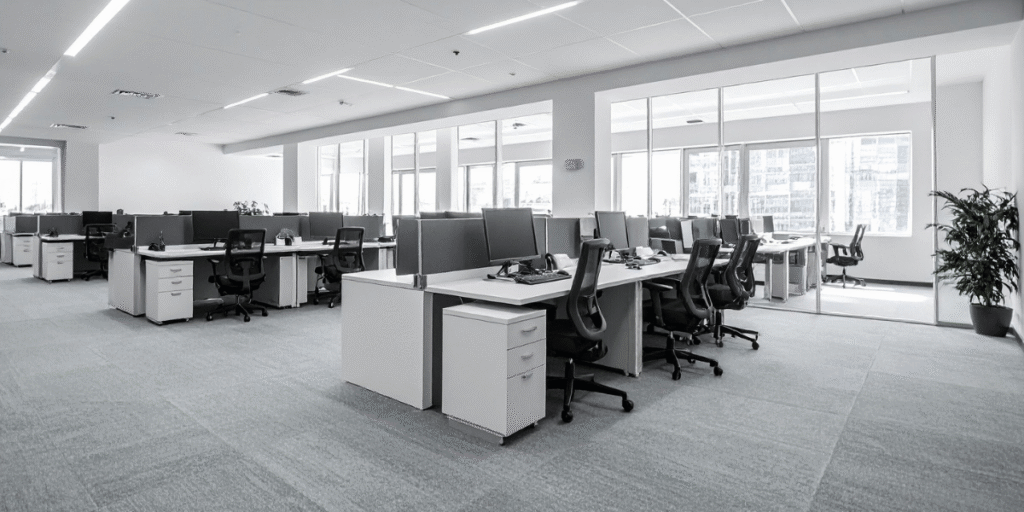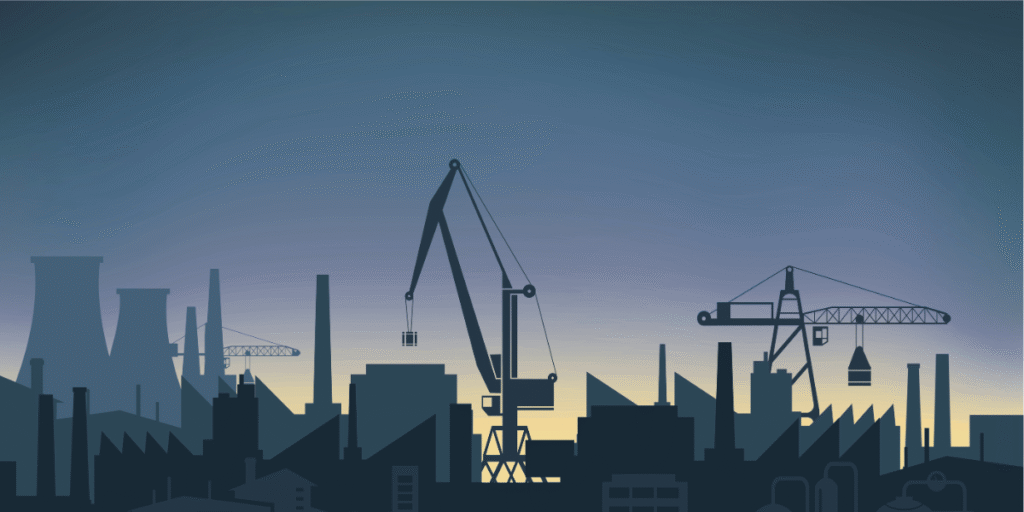Warehouse vs. Industrial Space: What’s the Real Difference?

Not all commercial real estate is created equal – especially when it comes to warehouse space vs. industrial space. While the two terms are often used interchangeably, they serve different functions and cater to distinct business needs.
Understanding these differences isn’t just helpful – it’s essential for choosing the right space, structuring your lease, and optimizing your operations. Let’s break down what makes them different, what they’re best used for, and how to choose the right fit.
What Is a Warehouse Space?
Warehouse real estate plays an essential role in the modern business world. These spaces are more than just storage units. Warehouses are multifaceted centers designed to manage and streamline warehouse operations. Warehouse infrastructures must be efficient and accurate, incorporating everything from sophisticated software systems to high-tech machinery, along with skilled employees.
Commercial warehouse space, specifically, is designed to support businesses in storing, managing, and distributing products. These spaces must be optimized for maximum productivity to keep up with the ever-changing demands of the industry. They often feature advanced logistics solutions, such as automated storage and retrieval systems, to handle large volumes of inventory efficiently.
In short, warehouse space, whether general or commercial, is a critical component of any successful business’s operations, providing the necessary infrastructure to manage inventory, improve distribution efficiency, and meet market demands.
Key Features of Warehouse Spaces
- Extensive Storage Capacity: Warehouse spaces are known for their ample storage capacity, allowing businesses to store inventory, supplies, and products in a centralized location.
- Racking Systems: These spaces often feature racking systems, shelves, and pallets to maximize vertical storage and efficient organization of goods.
- Loading and Unloading Areas: Warehouses typically include designated loading and unloading areas equipped with docks, ramps, and equipment for seamless movement of goods.
- Logistics Infrastructure: They may have integrated logistics infrastructure, including conveyor belts, automated sorting systems, and material handling equipment to streamline operations.
- Inventory Management Systems: Warehouse spaces often employ inventory management systems, such as barcode scanners and tracking software, to monitor stock levels, optimize supply chain processes, and ensure accurate order fulfillment.
- Climate Control Options: Depending on the stored goods’ requirements, warehouse spaces may offer climate control features like temperature and humidity regulation to preserve product quality.
- Security Measures: Warehouses commonly have security measures in place, such as surveillance cameras, access control systems, and security personnel, to protect stored inventory from theft or damage.
- Location and Accessibility: These spaces are strategically located to facilitate efficient transportation and distribution, with proximity to major roadways, ports, or airports for seamless logistics operations.

Is a Warehouse an Industrial Property?
Yes – a warehouse is considered an industrial property, but it’s just one type within a broader category.
Industrial real estate includes properties used for manufacturing, production, storage, and distribution. While all warehouses are industrial, not all industrial properties are warehouses. For example, a manufacturing facility or a cold storage center also falls under the industrial umbrella.
Here’s how they overlap:
- Industrial Property Includes:
- Warehouses
- Manufacturing plants
- Flex spaces
- Distribution centers
- Cold storage facilities
- Warehouse Is Specifically:
- Designed for storage
- Often used by logistics and e-commerce companies
- Typically includes loading docks, high ceilings, and open layouts
Warehouse vs. Distribution Center
While warehouses and distribution centers may look similar, their function is what sets them apart.
| Feature | Warehouse | Distribution Center |
|---|---|---|
| Primary Use | Long-term storage | Short-term storage & rapid shipping |
| Layout | Simpler, optimized for bulk | Complex, includes sorting zones |
| Turnover Rate | Low | High |
| Operations | Infrequent movement | Frequent shipping and receiving |
| Users | Retailers, e-commerce, wholesalers | Third-party logistics, big-box stores |
If your business needs to store goods for longer periods, a warehouse may be the right fit. But if you’re focused on fast-moving inventory, consider a distribution center.
Who Should Lease Warehouse Space?
Warehouse space is essential for many industries—but especially valuable for businesses that manage inventory or require fulfillment support. Common users include:
- E-commerce companies: To manage storage and order fulfillment.
- Wholesalers: Who supply goods to retailers and need bulk storage.
- Retailers with inventory overflow: Especially during seasonal peaks.
- Logistics and 3PL providers: That manage shipping and receiving operations on behalf of other businesses.
Other businesses like furniture importers, beverage distributors, and construction firms also rely on warehouse facilities for secure, functional storage that supports their day-to-day operations.
What Is Industrial Space?
Industrial space couldn’t be further from warehouse space, even though these terms are often used interchangeably. It is a type of property that combines the features of an office and a warehouse. It’s often used by businesses for manufacturing, assembling, fabricating and hosting meetings. Industrial space is different from warehouse space even though they are sometimes confused with each other.
It should be managed by an experienced manager who can make sure that all aspects of the business operations are considered adequately.
In conclusion, industrial space is an ideal property solution for any business wanting to carry out activities such as assembly, fabrication and manufacture, while also having somewhere suitable to host meetings.
Key Features of Industrial Spaces
- Ample Floor Space: Industrial spaces are characterized by their spacious layouts, providing substantial floor area for various operations and equipment.
- High Ceilings: These spaces often feature high ceilings to accommodate large machinery, storage racks, and vertical expansion possibilities.
- Loading Docks and Bay Doors: Industrial spaces commonly offer multiple loading docks and bay doors for seamless transportation, shipping, and receiving of goods.
- Specialized Infrastructure: They are equipped with specialized infrastructure, including heavy-duty electrical systems, ventilation, and utility connections to support specific industrial activities.
- Zoning Flexibility: Industrial spaces are typically situated in areas zoned for industrial use, allowing for diverse industrial operations and potential proximity to suppliers, customers, or transportation hubs.
- Flexibility for Layout Customization: These spaces provide the flexibility to customize the layout to meet specific operational requirements, enabling efficient workflows and optimal utilization of space.
- Security Measures: Industrial spaces often incorporate security features such as access control systems, surveillance cameras, and alarm systems to safeguard valuable assets and ensure a secure working environment.
- Adequate Parking and Vehicle Access: They typically offer ample parking space and easy vehicle access to accommodate employee parking, delivery trucks, and commercial vehicles.
Industrial Warehouse
An industrial warehouse is a large facility used for the storage, distribution, and management of goods, materials, and products on a commercial or industrial scale. Industrial warehouses are specifically designed to accommodate the needs of businesses and industries by providing ample storage space, efficient logistics, and often specialized facilities for handling different types of items.
Industrial warehouses are an essential component of supply chains and play a crucial role in the movement of goods from manufacturers to retailers or consumers. They offer a controlled environment for storing goods securely, protecting them from damage, theft, and environmental factors such as temperature and humidity.
Why Does the Difference Matter?
Knowing the difference between industrial and warehouse spaces can help you find out which one is best suited for your company and operations.
Many people mistakenly believe that these two types of spaces are interchangeable, but that couldn’t be further from the truth.
Commercial warehouse space is designed for storage and distribution, while industrial space is built to accommodate complex manufacturing processes. This distinction is crucial because choosing the wrong type of space can create a host of problems for your operation.
By taking the time to understand the differences between these two types of spaces, you can make an informed decision about which one is best suited for your company and operations.

When Should You Choose Warehouse Spaces?
When it comes to choosing warehouse spaces, it is important to consider the potential benefits that these spaces can offer.
While some companies may think that warehouses are only suitable for storage and distribution purposes, there are actually many benefits to turning them into creative office spaces.
This is especially true for companies that prioritize employee creativity and performance. By embracing the open space and unique layout of a warehouse, businesses can create an environment that fosters creativity and collaboration.
So, if you’re searching for a workspace that encourages innovation and productivity, a warehouse space could be the perfect choice for your business.
When Should You Choose Industrial Space?
Industrial space should be your choice if you have several types of business operations that you want to be performed in the same place.
Oftentimes warehouses are not big enough to accommodate all the needs in this case and the industrial space is simply a better option. You can put one department in one room and another in the additional space when you opt for industrial warehouse space.
Industrial warehouse space comes with the possibility of renting out individual spaces to tenants. Space can always be allocated for certain tenants, depending on their terms and demands.
Lease and Contractual Differences
When comparing warehouse and industrial spaces, it’s important to understand the lease and contractual differences that shape these commercial properties.
Warehouse leases typically involve long-term agreements, providing stability for both landlords and tenants. These leases often encompass storage, distribution, and inventory management. On the other hand, industrial spaces offer more diverse lease terms, ranging from short-term leases to build-to-suit arrangements.
These contracts cater to specific industrial activities such as manufacturing, assembly, or research and development. Warehouse leases prioritize storage capacity, loading docks, and logistics infrastructure, while industrial space leases focus on utility requirements, specialized equipment, and zoning compliance.
Should You Lease or Buy Office and Warehouse Space?
Now that you know the difference, the next logical question that arises is: do you lease or buy the space? Our experience says that many business owners and companies looking for warehouse space have seen more benefits from leasing warehouses instead of buying one.
On the flip side, some companies look for warehouse real estate to buy and hold as an investment. Typically, a real estate company that invests in warehouse buildings focuses on CAP rate when analyzing a property. If the building is currently leased with good cash flow, the warehouse could be a worthwhile investment for someone.
The sole reason for this is that when you choose a warehouse or industrial space for lease, you can sign the terms of the lease or make use of the space in long or short periods of time, whichever suits you best and brings the most advantages.
Knowing the differences between warehouse office space and industrial office space can save businesses a bundle, so get informed on time and choose what’s the best for your company and its operations.
Need help finding the right space for your business?
Get in touch with our team to explore available industrial and warehouse properties tailored to your operational goals.




